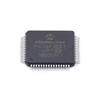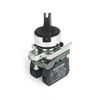Integrated circuits have come a long way since their inception in the 1950s, and their impact on modern technology is nothing short of astounding. These tiny titans have enabled the development of countless devices and innovations that have transformed our daily lives. As we look towards the future, it’s clear that the potential of integrated circuits is only limited by our imagination and the dedication of researchers and engineers working to push the boundaries of what’s possible.
In today’s highly connected and rapidly evolving world, the integrated circuit (IC) has become an essential component that powers the devices we use daily. From smartphones and computers to autonomous cars and smart homes, ICs have revolutionized the way we interact with technology. In this blog, we will delve into the fascinating world of integrated circuits, exploring their history, how they work, and their role in shaping the future of technology.
The Birth of Integrated Circuits
Integrated circuits, also known as ICs or microchips, have revolutionized the world of electronics by enabling the creation of small, lightweight, and energy-efficient devices. These tiny chips contain millions of electronic components, such as transistors and resistors, that are etched onto a piece of semiconductor material.
The origins of integrated circuits can be traced back to the late 1950s when Jack Kilby of Texas Instruments and Robert Noyce of Fairchild Semiconductor independently developed the first practical ICs. Their inventions paved the way for the modern electronics industry, as they allowed multiple electronic components to be combined into a single, compact unit. This breakthrough reduced the size, weight, and cost of electronic devices while increasing their performance and reliability.
Today, integrated circuits are an essential part of many products, from the smallest calculators to the largest supercomputers. Integrated circuits have become ubiquitous in modern life, appearing in everything from cars to home appliances to computers and smartphones. The invention of ICs has led to significant advances in modern technology, including the development of microprocessors that power computers, mobile phones, and many other devices.

How Does Integrated Circuit Work?
At its core, an integrated circuit is a collection of interconnected electronic components, such as transistors, resistors, capacitors, and diodes, all fabricated onto a single piece of semiconductor material, typically silicon. The miniaturization of these components and the connections between them has enabled the creation of incredibly complex circuits with millions or even billions of transistors. These circuits can perform various functions, including processing, amplification, and switching.
There are two primary types of integrated circuits: analog and digital. Analog ICs process continuous signals, such as audio and video, while digital ICs deal with binary data in the form of ones and zeros. The most common digital ICs are microprocessors and memory chips, which form the backbone of modern computing devices.
The Benefits of Integrated Circuits
Integrated circuits offer several benefits over traditional discrete circuits, including:
1) Small size: Integrated circuits can be much smaller than discrete circuits, which allows manufacturers to reduce the size of electronic devices.
2) Improved reliability: Because integrated circuits contain many components, they are less prone to failure than discrete circuits.
3) Increased performance: Integrated circuits can perform complex functions faster and more efficiently than discrete circuits.
4) Lower cost: By combining many components into a single chip, manufacturers can reduce the cost of electronic devices.
The Manufacturing Process: Integrated Circuit
The manufacturing process of integrated circuits is a complex and highly precise endeavor. It starts with the creation of a photomask, which contains the patterns for each layer of the circuit. This mask is then used to transfer the patterns onto a silicon wafer using a process called photolithography.
The wafer is then subjected to a series of chemical and physical treatments, such as etching and doping, to create the various components and connections within the circuit. Finally, the wafer is cut into individual chips, which are then packaged and tested before being integrated into electronic devices.
The Future of Integrated Circuits
As technology continues to advance, the demand for smaller, faster, and more efficient integrated circuits is ever-growing. This has led to the development of cutting-edge manufacturing techniques, such as extreme ultraviolet lithography (EUVL) and 3D chip stacking, which enable the creation of even more complex and powerful circuits.
Moreover, researchers are exploring new materials, such as graphene and carbon nanotubes, to potentially replace silicon as the basis for future ICs. These materials promise to push the boundaries of performance and efficiency, paving the way for exciting new applications in fields such as artificial intelligence, quantum computing, and the Internet of Things (IoT).
Easyiee Electric Dealer: A Professional Integrated Circuit Supplier
Easyiee is a professional integrated circuit supplier that offers a wide range of high-quality integrated circuits. With years of experience in the industry, Easyiee is dedicated to providing customers with the best products and services.
Whether you’re looking for a specific integrated circuit or need help selecting the right one for your project, Easyiee’s knowledgeable staff is always ready to assist you. So why wait? Visit Easyiee today and see how they can help you get the most out of your electronics projects!
Easyiee Electric Dealer is a trusted supplier of integrated circuits, offering a wide range of products from leading manufacturers. Its product line includes digital ICs, analog ICs, mixed-signal ICs, and microprocessors, as well as other electronic components such as capacitors, resistors, and diodes. With its extensive inventory, competitive pricing, and fast shipping, Easyiee is a one-stop shop for all your IC needs.
Conclusion
As a professional integrated circuit supplier, Easyiee takes quality seriously. All its products undergo rigorous testing and inspection to ensure they meet the highest standards of performance and reliability. Moreover, Easyiee provides excellent customer service, offering technical support and advice to help customers find the right components for their projects.





 2023-04-20
2023-04-20 


